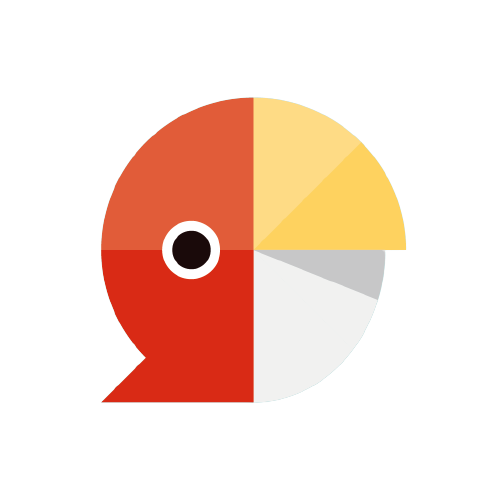A Brief History of the French Language
Introduction
Most people learn French to communicate with native speakers or to discover first-hand the rich French culture. However, it can also be interesting to delve into the fascinating history of French and the evolution of the language itself.
The French language, a Romance language spoken by millions worldwide, has a captivating story to tell. As a Romance language it shares its roots with Italian, Spanish, Portuguese and Romanian, all of them evolving from Latin. However, French has a distinct flavour that sets it apart. From Gaulish to Frankish to Norman influences, let's look into some common questions about the history of the French language and discover how it has transformed over time.
Where did the French language come from?
The origins of the French language are intertwined with the history of France itself. As noted above French is a mix of different languages. Latin, brought to the region by the Roman Empire, laid the foundation for the language. However, Gaulish, the native language spoken by the Gauls who inhabited France, continued to have a significant influence, especially in rural areas. The Latin used in France borrowed many Gaulish words, such as ‘mouton’ (sheep), ‘craindre’ (to fear), ‘changer’ (to change) and ‘manteau’ (coat). The Gauls are also thought to be responsible for the French’s odd way of counting (‘four-twenties’ for ‘eighty’).
Another crucial influence on French was the Frankish language. As the Roman Empire declined, Gaul was repeatedly invaded by Germanic tribes from the east, including the Franks. In fact, Frankish was the language of the French court and nobility for several centuries, resulting in the assimilation of many Frankish words. Words such as "garçon" (boy), "bateau" (boat), "robe" (dress), and "marcher" (to walk) are borrowed from Frankish, and French words ending in "-ard" and "-ange", like "canard" (duck) and "mélange" (mixture), are mostly of Frankish/Germanic origin. The Franks also had a big influence on pronunciation, which is one reason why today modern French seems so distinct from other Romance languages like Italian and Spanish.
The next big influence on the development of the French language came from the Normans. At the beginning of the 13th century the Duchy of Normandy was incorporated into French lands, and because of the Norman court’s power and prestige, Norman words were introduced into the French language, particularly with maritime, trade and agriculture vocabulary.
Who created the French language?
It would be more accurate to say the French language ‘evolved’, rather than was created. The Romans introduced it to Gaul in the form of Latin, and the Frankish nobility helped give French its unique flavour. King François I also played a big role as he declared French the official language of the Kingdom of France in the 16th century, replacing Latin and promoting its use in regions where local dialects were prominent.
When was the French written language created?
The earliest examples of French writing date from the 9th century. At that time most writing was in Latin, but texts began to appear that were written in what is termed Old French, or the French spoken in northern French at the time. Old French was not a single distinct language, but rather a melting pot of various dialects spoken in the region.
French literature’s first major work, La chanson de Roland (‘The Song of Roland’) was written in the 11th century. The oldest surviving manuscript was written in the mid-11th century; this manuscript is written in Anglo-Norman, one of the dialects of Old French. The popularity and influence of this epic poem and other literary works of the time led to Old French becoming the literary language of France, eventually supplanting Latin. This in turn led to spoken Old French becoming the lingua franca amongst the educated classes.
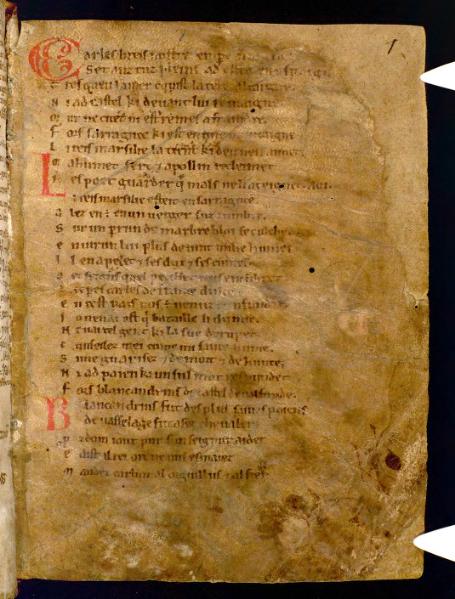
La Chanson de Rowland
How has French Changed Over Time?
The French language has changed greatly over time. The evolution of the French language can be divided into four distinct periods: Gallo-Romance, Old French, Middle French and Modern French.
Gallo-Romance
The Gallo-Romance period covers the time from Julius Caesar’s conquests of Gaul up until around the late 8th century when the Carolingian Empire began to emerge. Julius Caeser and the Romans brought Latin, both the formal written language which would remain France’s official written language for centuries, and the spoken Latin or vulgar latin. Vulgar Latin mixed with the various Gaulish dialects spoken by the conquered people of Gaul. Latin ended up dominating as it was the language of the rulers, and the locals wishing to get ahead tended to adopt it.
Old French
Old French originates from around the late 8th century. Gaul had been subject to invasions from Germanic tribes from the north and east, some of whom remained and settled there. The Franks were one of these tribes and settled in the northern region of France. As the Franks became more powerful, to the point of ruling large parts of France as kings, so did their Frankish language’s influence increase. Although most writing was still done in Latin, Old French gradually increased in usage in official circles as was the burgeoning literature of northern France. Comparing these Old French documents with Latin it can be seen that the language had developed its unique characteristics, to the point where the two languages were no longer mutually intelligible.
Middle French and Modern French
The Middle French period covers the 14th to the end of 16th centuries. It was in this period that French developed the features and characteristics that made it similar to modern French. (In contrast, French speakers today would find it difficult to read an Old French text). In the 16th century, King François I made French the official language of the Kingdom of France, supplanting Latin and also help spread it to those regions where local dialects were still prominent. This also marked the start of Modern French.
When was French first spoken?
We will never know when French was first spoken because, of course, there were no sound recordings from those times. Instead, we only know that the language very slowly evolved over almost two millennia. Linguists believe there were some significant turning points on the way. Spoken French began to deviate significantly from other Romance languages first with the arrival of Frankish settlers who brought with them a few new vowel sounds. Later during the Old French period French is believed to have developed its characteristic nazalization of certain vowels. Linguists also estimate that the Middle French period was when French multi-syllabic words lost their stress.
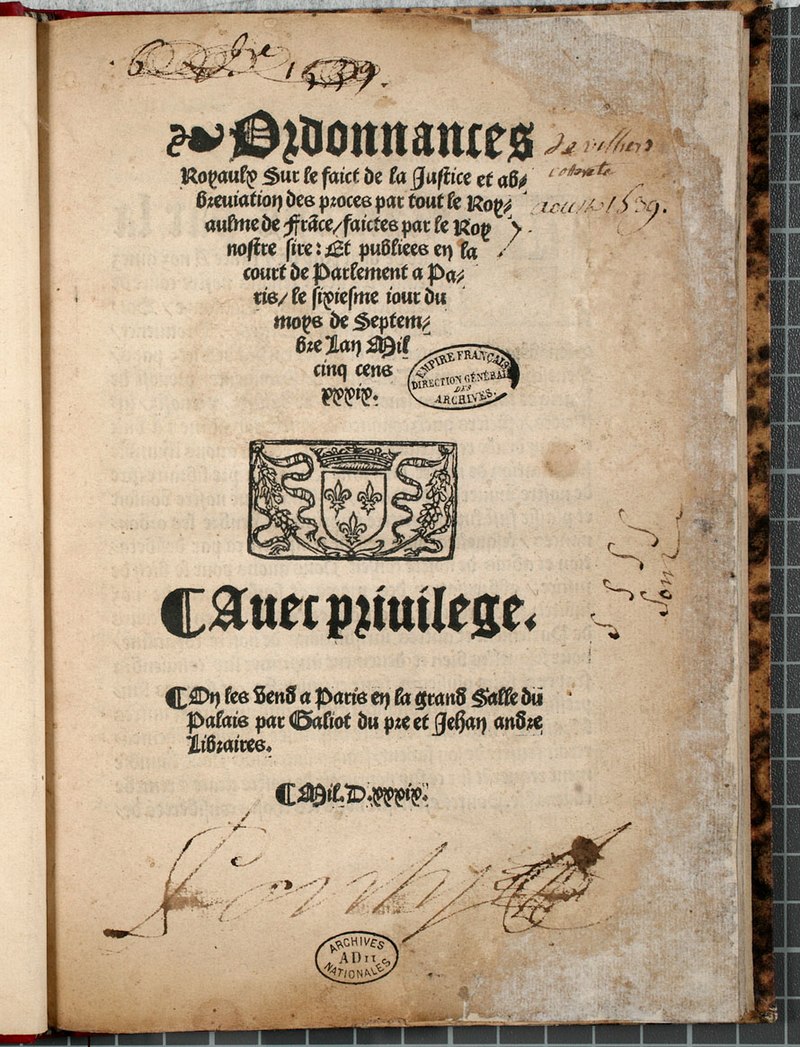
Ordonnance de Villers
How has the French language spread around the world?
French has made its mark across the globe. It is an official language of 29 countries and has an estimated 80 million native speakers, and 235 million people can speak it fluently. Another estimated 75 to 110 million people speak it as a second language. French initially spread to its nearest neighbours, expanding as France expanded its borders through conquest. Parts of Switzerland, northern Italy and Belgium speak French as a result of French occupation centuries ago. Even English received a huge influx of French vocabulary as a result of the Norman invasions.
The French language’s greatest expansion was the result of France’s rise as a colonial power. When the French colonised parts of North America, Africa and Asia they brought their language with them. To this day French is the official language of former African colonies like Senegal, Mali, the Democratic Republic of Congo and Côte d’Ivoire, and a co-official language in several more.
As France became the major power in Europe, so did its influence on the rest of the continent. French was the language of diplomacy, of science and of the arts. In the 18th and 19th centuries French was almost as much the lingua franca as English is today.
If you’d like to know how French ranks in the list of most studied languages today, you can find out in this blog article.
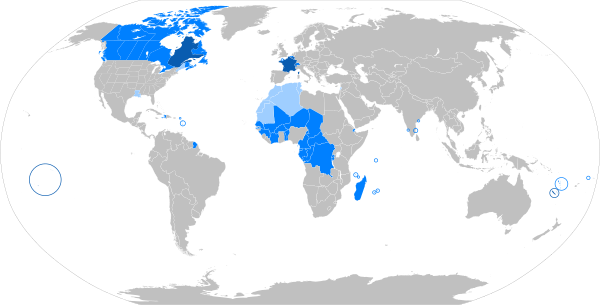
French Language Global Distribution
Are other languages and dialects spoken in France?
France, like many European countries, boasts a rich tapestry of regional dialects and languages, adding to its linguistic diversity. First, we should define what is a language and how is it different from a dialect. The distinction between can be blurry, as linguists have yet to agree on a universally accepted definition.
You may have heard the old joke that a language is a dialect with an army and a navy. Behind the joke is the theory that a language has an official status, spoken by a nation. In contrast, a dialect usually refers to a language spoken in a geographical region. For instance, Russian and Ukrainian are similar enough that speakers of both languages can communicate with each other, yet they are considered separate languages due to the separate political status of the two nations. On the other hand, some dialects spoken within a country, such as those in China, may be mutually unintelligible to speakers from other regions but are still classified as dialects. To muddy the waters further, some linguists are starting to elevate what were once considered dialects to the status of language, especially when they are markedly different from the official language of the country, for example Catalonian in Spain.
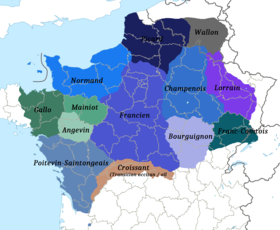
Northern French Dialects
What are some of the main French dialects?
Like many European countries France has a lot of regional dialects, some of them quite different from French. Here are some of the most widely spoken:
Occitan
Occitan (also known as Provençal) is spoken in parts of southern France, especially in rural areas. Twenty-five years ago, an estimated 600,000 people spoke Occitan, however that number has since decreased dramatically. There have been attempts to revive the language for fear that it will will die out completely in a couple of generations. One effort is the establishment of bilingual pre-schools (called Calandreta) to introduce the language to young children. And if you visit Toulouse and other cities and towns in the region you will see bilingual street signs.
Breton
Breton is spoken in parts of Brittany in south-west France. It belongs to the Celtic school of languages, brought over by settlers from Britain more than a thousand years ago. It’s usage, like Occitan, has declined dramatically over the last few decades, and there are probably only about 200,000 speakers remaining, mostly elderly. It is on UNESCO’s list of severely endangered languages, so there have been several initiatives to revive it, most importantly the establishment of bilingual schools called Diwon schools. Unlike Occitan’s Calandreta the Diwon schools provide bilingual education right up to the Baccalauréat.
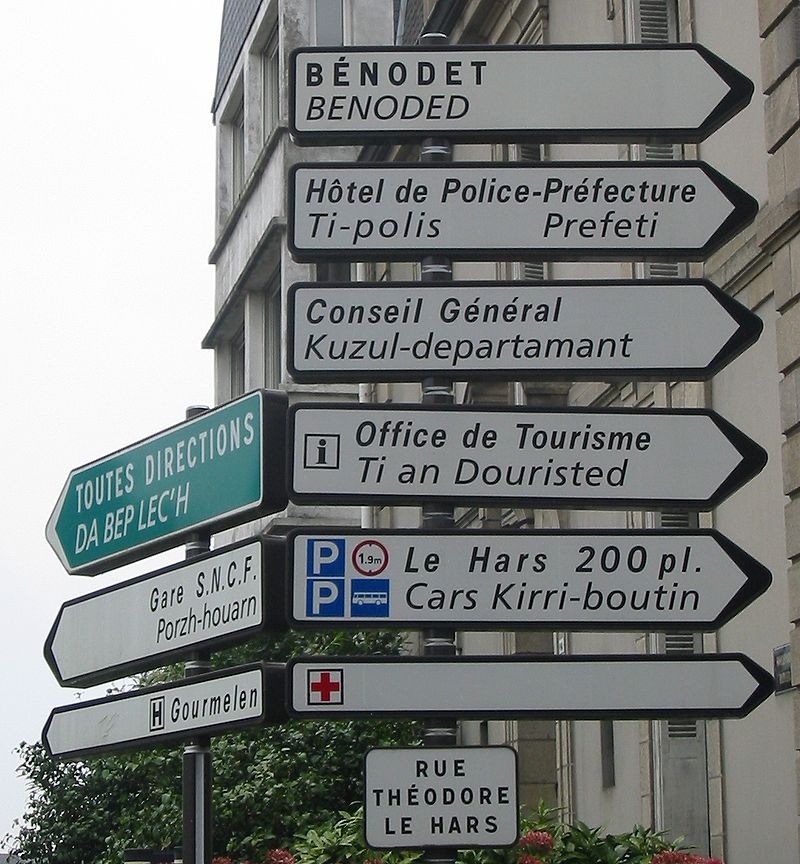
Bilingual Sign in Breton
Corsican
Corsican (also known as Corsu) is spoken on the French island of Corsica. It’s actually more closely related to Italian and is considered by most linguists as an Italian dialect rather than a French one. Like most regional dialects Corsican usage has declined over the years, though around a third of the island’s 230,000 population claim to speak Corsican well or reasonably well.
Alsatian
If Corsican is an Italian dialect, then Alsatian, spoken in the Alsace area in the east of France near the German border, is very much a German dialect. It’s estimated that perhaps half the population of Alsace know some Alsatian, though most of those who speak it fluently are of the older generations.
Why are French regional dialects endangered?
One reason the regional languages are declining in usage is because the French government has not shown much support for encouraging linguistic diversity. This attitude dates back to the time of the French Revolution, the revolutionaries believing that administrative centralisation they were bringing to the country should be extended to languages. If the majority of the people couldn’t understand the workings of the parliament or the courts then, they reasoned, France’s jumble of regional dialects was undemocratic. Since then, many governments, both on the left and the right, have been opposed to funding or recognition of regional dialects. It has been left to volunteers, private organisations and local governments to take on the responsibility of preserving these dialects to ensure they don’t die out.
Conclusion
Of course, learning about the history of the language isn’t the only reason to learn French. For eight additional and persuasive reasons to begin learning French today you can read this blog article.
Author
Nick Dennis

Nick is an English teacher who has taught English as a Foreign Language in China, Italy and France. He has a Bachelor of Arts (Modern Languages), majoring in French, from the University of New South Wales. He loves travel, reading and football and, of course, learning languages. Four years ago, Nick and his wife co-founded an online English language school targeted at the Chinese market (since sold to Chinese investors). He has also ghost-written the autobiography of a well-known Australian horse trainer.
